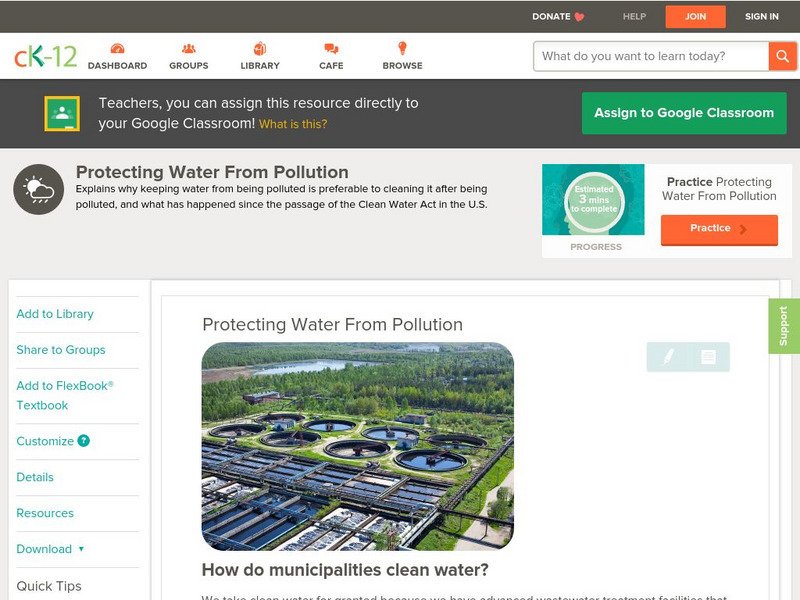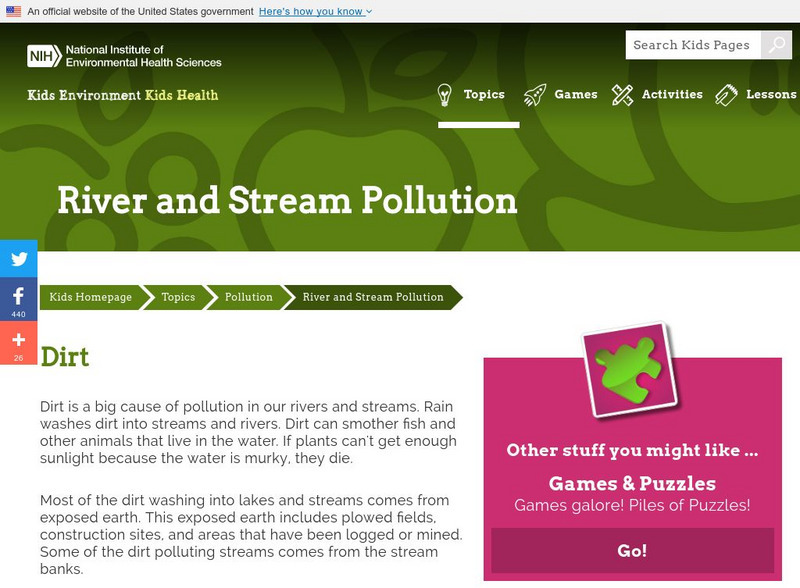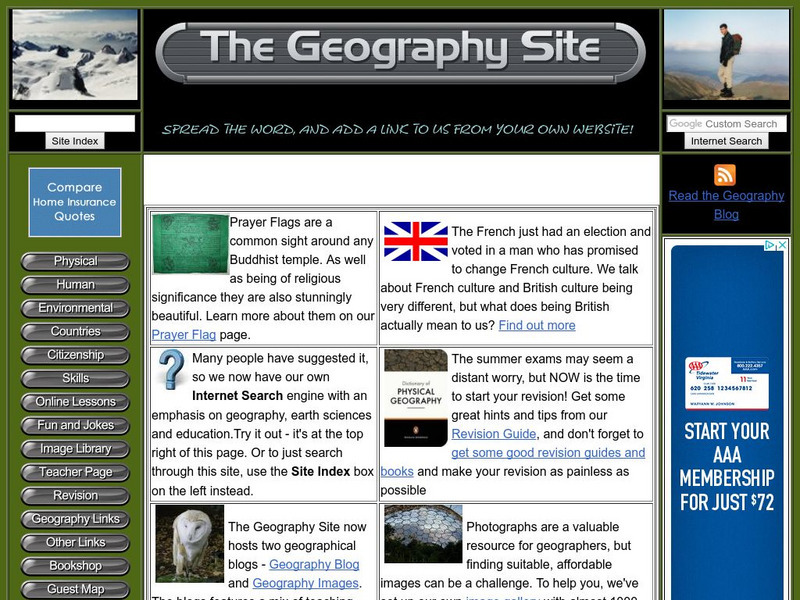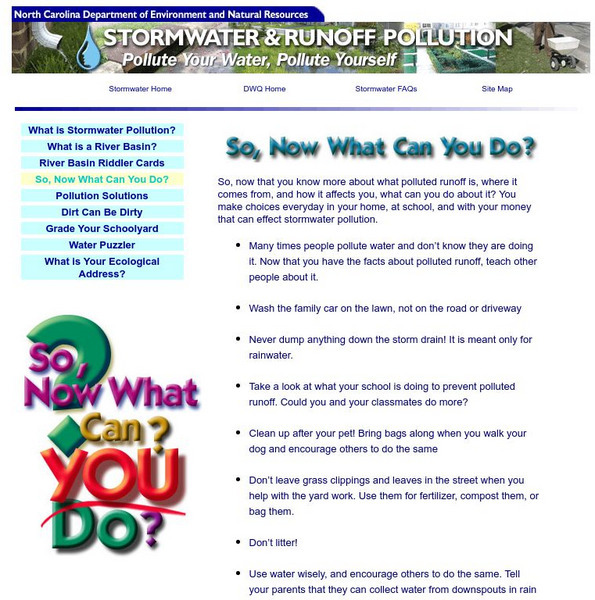Other
The Water Pollution Guide
Welcome to the Water Pollution Guide, where you can find useful information about the sources of water pollution and how they can be treated.
CK-12 Foundation
Ck 12: Earth Science: Protecting Water From Pollution
[Free Registration/Login may be required to access all resource tools.] Explains why keeping water from being polluted is preferable to cleaning it after being polluted, and what has happened since the passage of the Clean Water Act in...
CK-12 Foundation
Ck 12: Earth Science: Water Pollution
[Free Registration/Login may be required to access all resource tools.] Describes the sources of water pollution, such as municipal, industrial, and agricultural.
Virginia Institute of Marine Science
Virginia Institute of Marine Science: Ghostbusting in the Chesapeake
Because abandoned crab fishing pots can create havoc in the marine ecosystem, scientists and fishermen are researching ways in which to collect them. In this lesson plan young scholars will explore catch data collected by the watermen...
American Geosciences Institute
American Geosciences Institute: Earth Science Week: Hands on Experiments to Test for Acid Mine Drainage
Fifteen short experiments which test acid mine damage to the streams, rivers, and creek ecosystems surrounding it.
Alabama Learning Exchange
Alex: Is My Water Safe?
After a discussion of what makes water safe or unsafe, students will visit a local tributary, test the water, and complete tasks concerning the water. This lesson is designed for a 6th, 7th, and 8th grade gifted education enrichment...
Alabama Learning Exchange
Alex: Water You Doing to Help?
In this lesson from "The Friends of Auntie Litter", (www.auntielitter.org), water pollution will be explored. This lesson is one from the "Take Pride Statewide" series. *This lesson is provided by Julie Danley, Pam Walston, and Pat...
Alabama Learning Exchange
Alex: Tad the Tadpole
Tad the Tadpole is designed to demonstrate how pollution in various areas affects wildlife in their native habitats. The activity is designed to stress the importance of conservation for animals and their surrounding environment. Upon...
Alabama Learning Exchange
Alex: Fred the Fish a Little River Trip
Little River is home to 47 kinds of fish including the threatened "Blue Shiner" Cyprinella caerulea. These fish depend on the good water quality at Little River. This skit allows students to observe pollution's effects on a small scale...
Khan Academy
Khan Academy: The Economics of Pollution
Pollution is an example of a negative externality. Despite the gradual reduction in emissions from fossil fuels, many important environmental issues remain. Along with the still-high levels of air and water pollution, other issues...
CK-12 Foundation
Ck 12: Life Science: 12.27 Water Pollution
Understand water as a limited resource, and how it becomes polluted.
Other
Coalition of Oregon School Administrators (Cosa): Microbeads, Mega Problem [Pdf]
A textbook activity where students work in teams to design a device or technique that will prevent plastic microbeads from entering local lakes and streams. They will use the engineering process to design a solution and then present...
Environmental Education for Kids
Eek!: Teacher Resources: Groundwater Study Guide [Pdf]
This study guide is designed to help students begin thinking about groundwater - where it comes from, why it's important, and how it can be conserved and protected. The guide includes a brief overview of groundwater, a glossary, and...
PBS
Pbs Learning Media: Quest: Water Pollution Investigation
Water pollution is the contamination of water resources by harmful wastes or toxins. This type of pollution can be dangerous to animals and plant populations in and around lakes, rivers, polluted groundwater areas or oceans, and can pose...
PBS
Pbs Learning Media: Trade Secrets: Transcript
Trade Secrets reveals how the public's right to know the truth about the thousands of chemicals that surround us has been compromised.
NOAA
Noaa: Ocean Facts on Runoff Pollution
Find out how water pollution can be prevented and how it affects you.
National Institutes of Health
Niehs: Kids' Pages: River and Stream Pollution
What makes our rivers and streams dirty? This brief overview discusses the causes of pollution in rivers and streams and how to solve it.
US Environmental Protection Agency
Epa: The Planet Protectors: Activities for Kids
Through this EPA resource, explore your environment and discover the animals, plants, air, and water around you. Learn how to protect the world we live in with fun games.
Science Education Resource Center at Carleton College
Serc: Mn Step: Water Runoff: How the Ground Water in Your Community Is Affected
After creating a model, students will investigate factors that affect water runoff both positively and negatively, and the impact this has on the quality of groundwater.
Michigan Reach Out
Ocean in a Bottle
At this site pupils will discover what happens when oil or liquid detergent are dumped into our earth's water supply.
Other
The Geography Site
The Geography Site offers many links for your geography research. Links offered are to physical geography, human geography, environment, online lessons, and much more.
Other
Effects of Thermal Pollution
Informational site that provides insight into what thermal pollution is and how it harms the environment.
Other
Nc Department of Energy and Natural Resources: So, Now What Can You Do?
A list of ways people can make good choices in everyday activities so as not to contribute to stormwater pollution.
Other
North Carolina Department of Energy and Natural Resources: Dirt Can Be Dirty
Did you know that the #1 pollutant in North Carolina is dirt? When soil is washed into streams and river, it smothers small animals and fish by clogging their gills. Look for bare patches of ground around your home and around your school...




















